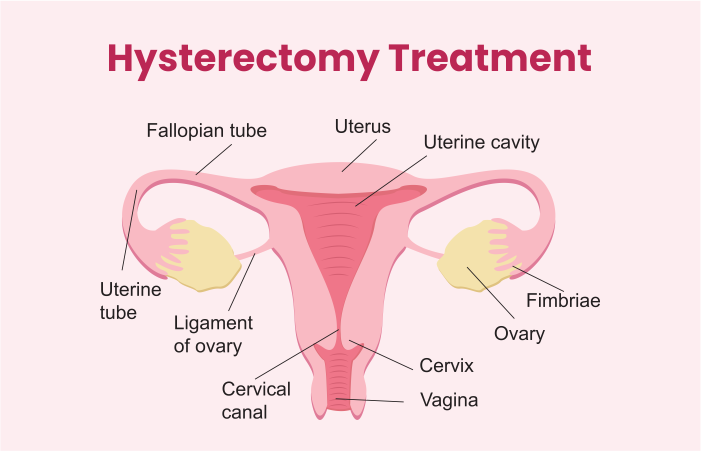Hysterectomy Treatment in Hyderabad

What is Hysterectomy
TX Hospitals, your trusted destination for advanced gynecological care in Hyderabad. If you are considering or have been recommended for a hysterectomy, we are here to provide comprehensive information about hysterectomy treatment.

What is Hysterectomy Treatment?
Hysterectomy treatment is a surgical procedure that involves the removal of the uterus, and in some cases, additional reproductive organs such as the cervix, ovaries, and fallopian tubes. It is a common procedure performed to address various gynecological conditions, including uterine fibroids, endometriosis, pelvic organ prolapse, and certain types of cancer.
Why is Hysterectomy Treatment Performed?
Hysterectomy treatment is recommended when other treatment options have been exhausted, and the gynecological condition significantly impacts a woman’s quality of life. It may be performed to alleviate symptoms such as chronic pelvic pain, excessive menstrual bleeding, pelvic pressure, or to address underlying conditions that pose a health risk.
Types of Hysterectomy Procedures
Abdominal Hysterectomy: This procedure involves making an incision in the abdomen to access and remove the uterus. It is commonly used when the uterus is enlarged or other complications exist.
Laparoscopic Hysterectomy: A minimally invasive procedure where several small incisions are made, and a laparoscope (a thin tube with a camera) is used to guide the removal of the uterus.
Total Abdominal Hysterectomy (TAH) Procedure: TAH involves the removal of the uterus and cervix through an abdominal incision. This procedure is typically performed when there is a risk of cervical cancer or other conditions affecting the cervix.
Uterus Removal Operation: This refers to the overall process of removing the uterus, whether performed through an abdominal or laparoscopic approach.
How to Prepare for Hysterectomy Treatment?
Preparing for hysterectomy treatment involves several steps to ensure a smooth and successful procedure:
- Consultation and evaluation: Your gynecologist will assess your specific condition, discuss treatment options, and determine if hysterectomy is the right choice for you.
- Pre-operative instructions: You will receive guidelines on fasting, medication management, and any necessary lifestyle adjustments before the surgery.
- Preparing for recovery: Arrange for assistance during the recovery period and ensure you have a comfortable and supportive environment at home.
- Addressing concerns: It is essential to have an open discussion with your healthcare provider about any concerns or questions you may have to ease any apprehensions before the procedure.
Frequently Asked Questions (FAQs)
A hysterectomy is a surgical procedure that involves the removal of the uterus. In some cases, additional reproductive organs such as the cervix, ovaries, and fallopian tubes may also be removed.
Hysterectomy treatment is performed to address various gynecological conditions such as uterine fibroids, endometriosis, pelvic organ prolapse, adenomyosis, and certain types of cancer. It is recommended when other treatment options have been ineffective or when there is a significant impact on a woman’s quality of life.
Yes, there are different types of hysterectomy procedures. They include:
Total Hysterectomy: Removal of the uterus and cervix.
Partial Hysterectomy: Removal of the uterus while preserving the cervix.
Radical Hysterectomy: Removal of the uterus, cervix, upper vagina, and surrounding tissues. It is typically performed for certain types of gynecological cancers.
Laparoscopic Hysterectomy: Minimally invasive surgery using small incisions and a laparoscope to remove the uterus.
Abdominal Hysterectomy: Open surgery where an incision is made in the abdomen to access and remove the uterus.
Recovery time varies depending on the type of hysterectomy performed and individual factors. Generally, it takes about 4-6 weeks to recover fully. It is important to follow the post-operative instructions provided by your gynecologist and take adequate rest to aid in the healing process.
If the ovaries are removed along with the uterus (oophorectomy), it can induce menopause. However, if the ovaries are preserved, menopause will not occur immediately, although it may occur naturally at a later stage.









